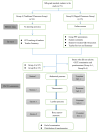Evaluation of the effectiveness of using flipped classroom in puncture skills teaching
- PMID: 38395791
- PMCID: PMC10885647
- DOI: 10.1186/s12909-024-05132-8
Evaluation of the effectiveness of using flipped classroom in puncture skills teaching
Abstract
Background: The effectiveness of flipped classroom (FC) on puncture skills in medical education is still uncertain. This study aimed to assess the role of the FC model in puncture skills and investigate the acceptance and approval of FC among medical students and instructors.
Methods: A mixed research approach of quasi-experimental research design and descriptive qualitative research was conducted in September 2022 for one month, using an FC teaching method that combined instructional videos and group learning. The study participants were 71 fifth-year medical students from two classes at a Chinese medical school and four instructors. The medical students were randomly divided into two groups: the traditional classroom (TC) group (Group A) and the FC group (Group B). For teaching, Group B used FC, and Group A used PowerPoint-based TC. The effectiveness of the two teaching models was assessed with Objective Structured Clinical Examination (OSCE), and questionnaires were distributed to the medical students and instructors after the assessment. Two independent sample t-tests were used to analyse the differences in demographic data and the OSCE scores of the two groups of medical students.
Results: Group B scored higher in puncture skills than Group A, especially regarding abdominal puncture (p = 0.03), thoracentesis (p < 0.001), bone marrow puncture (p < 0.001) and average performance of puncture skills (p < 0.001). For lumbar puncture, no difference in skill scores was observed between groups A and B (p > 0.409). The medical students thought that the FC improved their self-learning ability and helped them acquire knowledge. Regarding the OSCE of their skills, most medical students thought that it was more innovative and objective than traditional examinations and that it was better for assessing their overall abilities. Both the FC and OSCE were supported by the medical students. The instructors were also satisfied with the students' performance in the FC and supported the teaching model, agreeing to continue using it.
Conclusions: This study shows that FC teaching that combines instructional videos and group learning is a reliable and well-received teaching method for puncture skills, which supplements and expands existing teaching methods in the medical field.
Keywords: Flipped classroom; Medical students; Objective structured clinical examinations; Questionnaire; Traditional classroom.
© 2024. The Author(s).
Conflict of interest statement
The authors declare no competing interests.
Figures



Similar articles
-
The effect of flipped classroom in multiple clinical skills training for clinical interns on Objective Structured Clinical Examinations (OSCE).Med Educ Online. 2022 Dec;27(1):2013405. doi: 10.1080/10872981.2021.2013405. Med Educ Online. 2022. PMID: 34898400 Free PMC article.
-
Short- and Long-Term Influences of Flipped Classroom Teaching in Physiology Course on Medical Students' Learning Effectiveness.Front Public Health. 2022 Mar 28;10:835810. doi: 10.3389/fpubh.2022.835810. eCollection 2022. Front Public Health. 2022. PMID: 35419334 Free PMC article. Clinical Trial.
-
Validation of Use of Flipped Classroom for Surgery Core Clerkships.J Surg Educ. 2022 May-Jun;79(3):668-675. doi: 10.1016/j.jsurg.2021.12.005. Epub 2021 Dec 28. J Surg Educ. 2022. PMID: 34972671
-
Flipped classrooms in pharmacy education: A systematic review.Saudi Pharm J. 2023 Dec;31(12):101873. doi: 10.1016/j.jsps.2023.101873. Epub 2023 Nov 13. Saudi Pharm J. 2023. PMID: 38033750 Free PMC article. Review.
-
The effects of flipped classrooms to improve learning outcomes in undergraduate health professional education: A systematic review.Campbell Syst Rev. 2023 Jul 7;19(3):e1339. doi: 10.1002/cl2.1339. eCollection 2023 Sep. Campbell Syst Rev. 2023. PMID: 37425620 Free PMC article. Review.
References
MeSH terms
Grants and funding
LinkOut - more resources
Full Text Sources

